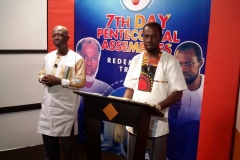Watchmen on Spiritual Walls
By: Elder Enoch Ofori Jnr
(Sabbath, 5th November, 2011)
There’s no Substitute for Personal Earnest Prayer
Is your prayer life losing steam? I won’t be surprised if it is. But apparently prayer—that once energizing power of the Church—is becoming one of the dreariest rituals in today’s ‘fast-food’ Christianity! The craze for instant gratification and ‘quick fixes’ by the majority of the churchgoing public has meant that prayer has been relegated to second place, if not to a much lower level, in the lives of most professing Christians.
Somebody might say, ‘but Pastor, large numbers of people troop to prayer meetings each week, some even thrice or twice in the week’. I concede, yes, they do, but the truth of the matter is that most don’t attend what we might call a typical prayer meeting where believers come together to pray. Instead, they attend so-called ‘prophetic nights’ and ‘anointing services’ to be prophesied to, to be prayed for, to consult the oracle from the ‘man of God’ and to buy special ‘anointing oil’, ‘holy water’ and other supposedly ‘anointed’ sacred items from him. These ‘charismatic’ prayer meeting attendees do everything except to pray–earnestly and determinedly!
This is not the model we have of the early Church whose faith we must emulate (Jude 1:3; Heb. 13:7). For them, much as the elders were to pray for the sick (Jam. 5:14-15; Acts 9:35-42) and the brethren for one another (Jam. 5:16; Eph. 6:18), prayer was both personal and communal. From the small to the great, all lifted up their voices in prayer (Acts 1:13-14, 2:42). In Acts 12, when Peter was imprisoned by Herod, the spontaneous response of the Church was to come together and pray on his behalf; the result was that he was delivered by an angel of the Lord (vv. 1-17).
There’s no short cut when it comes to worshipping God in spirit and in truth as laid down in His word; there is no substitute for personal, earnest prayer!
In case you have forgotten, God loves an importunate petitioner! In Luke 18:1 Christ tells a parable to the effect that “men ought always to pray, and not to faint”. In the parable, which He subsequently relates, the Lord narrates how a widow by her persistence in demanding justice from an ungodly judge compelled the judge to grant her request in spite of his inconsiderate nature, because he couldn’t stand her unceasing pleas and visits any more (vv. 2-5). The Lord then comments: “Hear what the unrighteous judge says. And will not God give justice to His elect, who cry to Him day and night? Will He delay long over them? I tell you, He will give justice to them speedily. Nevertheless, when the Son of Man comes, will He find faith on earth?” (vv. 6-8 ESV).
That’s the critical question to answer! Do you still have enough faith as a believer to pray the kind of persistent prayer God listens to and acts on?
In yet another parable in Luke 11:5-13, the “Parable of the Friend at Midnight”, Christ again teaches the importance of persistent prayer in receiving answers to our prayer requests from God. The overall point the Lord impresses on us is that perseverance in prayer is the way to get God to act mightily for us!
Do not Keep Silent
In Isaiah 62, the prophet Isaiah emphasizes the need for God’s people who look for His salvation not to keep silent but put God in remembrance of His promise until He performs it:
“I have set watchmen upon thy walls, O Jerusalem; they shall never hold their peace day nor night: ye that are the LORD’S remembrancers, take ye no rest, and give Him no rest, till He establish, and till He make Jerusalem a praise in the earth” (Isa. 62:6-7 RV).
The idea of uninterrupted vigil—staying awake and watching—is sustained throughout the text. Watchmen by the nature of their job don’t sleep at night but are still told not to “hold their peace day nor night” and to “take no rest”.
“Let’s Arise and Build”
The ‘walls of Jerusalem’ and the vigil of the watchmen remind us of the builders of the walls of Jerusalem during the days of Nehemiah.
Upon returning from Persia with the blessing of the emperor obtained in direct answer to prayer (Neh. 1:1-2:8), Nehemiah went on a night tour of post-exilic Jerusalem to inspect “the walls of Jerusalem, which were broken down, and the gates thereof were consumed with fire. Then I went on to the gate of the fountain, and to the king’s pool: but there was no place for the beast that was under me to pass. Then went I up in the night by the brook, and viewed the wall, and turned back, and entered by the gate of the valley, and so returned. And the rulers knew not whither I went, or what I did; neither had I as yet told it to the Jews, nor to the priests, nor to the nobles, nor to the rulers, nor to the rest that did the work” (Neh. 2:12-16).
Sorely displeased with the state of ruin in which Jerusalem had fallen, Nehemiah spoke to the leaders of the people and the workers engaged in the rebuilding effort, who apparently were not as worried as he was, as to “how Jerusalem lieth waste, and the gates thereof are burned with fire” and then exhorted them, “come, and let us build up the wall of Jerusalem, that we be no more a reproach” (v. 17).
Upon telling them of the favour shown him by God in inspiring the king’s favour and assistance, the people with renewed enthusiasm chorused: “Let us rise and build” (v. 18).
But then Sanballat and Tobiah, being perennially opposed to the rebuilding of Jerusalem (v. 10), ridiculed him terribly (v. 19). Instead of the vicious taunts breaking down his spirit, however, Nehemiah responded with calm confidence in God: “The God of heaven, He will prosper us; therefore we His servants will arise and build: but ye have no portion, nor right, nor memorial, in Jerusalem” (v. 20).
Beloved, could you be in the shoes of Nehemiah? Does some unfinished business in God’s kingdom make you restless? Know that God’s favour is available for you, even though enemies are dead set against you! Like Nehemiah, don’t be dismayed by all the malicious talk of the enemy. Forge ahead with the task God has entrusted to you, and He will give you success.
True to their commitment to rebuild the broken walls of Jerusalem, Nehemiah and the rest of the people (in the continuation of the story in chapters 3&4) got the construction works started, with the enemies equally determined to stop the work. The effective response adopted by Nehemiah and the people of Judah to the organized opposition to the work was to strengthen themselves in God.
Remarkably, all it took to trigger the organized opposition was news of the progress of the work. On hearing that the Jewish returnees were building the wall, Sanballat, the ‘chief opposer’, was overcome with anger and indignation (4:1), which soon solidified into mockery—a standard strategy of those who wish to discourage God’s people engaged in His work (1b).
Next, the opposition closed ranks; they banded together and rallied their associates who all had a common hatred for God’s work (v. 2). Once again, they mocked God’s people deriving satisfaction from the fact that they were weak and helpless (vv. 2-3).
Doesn’t all this seem familiar? The way Satan and his agents fight God’s people engaged in His work of deliverance and restoration hasn’t changed since Nehemiah’s days and even long before that. So let’s not such opposition get us down when we encounter them in the course of our work as the servants of God. It’s an ‘occupational hazard’ peculiar to us (Mark 10:28-30; 2 Tim. 3:12).
Thankfully, we have the real-life experiences of our forebears in the faith to draw on (Rom. 15:4), in this instance Nehemiah and his contemporary Jewish restorers. How did they rise to the challenge of the formidable opposition to their rebuilding of Jerusalem?
They prayed to God as their response to the opposition of the enemy. In their prayer, they laid two petitions before God: a formal complaint against the enemies and a plea for vengeance against them (Neh. 4: 4-5).
Then they proceeded with the work, making sure any work undone was done, in a single-minded pursuit—the exact mindset needed in readiness to counter the greater enemy wrath the progress of the work was sure to provoke (vv. 6-7).
For the enemies of Jerusalem and of Jews, the situation had now reached intolerable levels; they could simply not bear the thought of seeing the walls of Jerusalem up again. The only alternative left was to take concrete action to stop the work once and for all. They reasoned, ‘all the insults and mockery have failed to stop these people; now we need to fight them to bring a halt to the work.’ So they “conspired all of them together to come and to fight against Jerusalem, and to hinder it” (v. 8).
Brethren, do we relax our vigilance and prayer because the work of God is making more and more progress, because we are reaching out to more people with the saving Gospel of our Lord Jesus Christ and bringing in more and more of the lost and perishing? The answer is a resounding NO! The devil is boiling with rage at us because despite all his disruptive activities the Almighty continues to prosper us!
So, as before, Nehemiah and his people prayed to God, only this time more intensely (v. 9) and took firm action to checkmate the threat of the enemy by setting “a watch against them day and night” (v.10). It was Prov. 16:3 put into action: “Ask the LORD to bless your plans, and you will be successful in carrying them out” (GNB).
However, as in all eras, the people of God were of uneven faith, and the enemies’ threats began to take their toll on the faith of some of the Jews (v. 10), as reports reached them of the enemies’ plot to attack them surreptitiously (vv. 11-12).
But Nehemiah was not a man to be intimidated; he was a man of faith and action. He organized the people into units of fighters combat-ready to fight the enemy should they attack them anytime any day, while they kept going with the work. Seeing the sheer determination and preparedness of the Jews to counteract any attack of theirs was enough to throw the plans of the enemies into utter confusion. God, who makes Jerusalem prosperous, brought their evil counsel to nought, and their threat fizzled out (vv. 13-23).
Although Sanballat and his cohorts subsequently resorted to intrigue (chapter 6) in their unremitting desire to foil the restoration of Jerusalem, that also failed, and the work was successfully completed (chapter 7).
The Nehemiah spirit is the way to defend and prosper the walls of Jerusalem—a never-give-up spirit that comes up against great challenges and opposition but never rests or despairs till the fallen walls of Jerusalem are up again!
“For Jerusalem’s Sake I will not Rest”
Beloved, we are the Jerusalem with broken walls, but we have not been called to wail over our plight, resigned to ‘our ill-fate’ as it were. We are to cry out in prayer and not to rest till our God makes us “a praise in the earth”.
Our present circumstances as a church, a family and as individuals do not constitute our ultimate level of blessing in life or in the Kingdom of God. We are destined for greater blessings, but it’s only by being restless in prayer and vigilance that those blessings will materialize despite all enemy expectations and actions to the contrary. The great importance of persistent prayer is that we hold God to His promise of blessings made to us; we put Him in continual remembrance of it till He fulfills it.
What makes the situation even better is that God Almighty Himself is our great companion in our restless quest to see Jerusalem restored to glory. Yes, He is committed not to rest till we become “a crown of glory” in His hand:
“For Zion’s sake will I not hold my peace, and for Jerusalem’s sake I will not rest, until the righteousness thereof go forth as brightness, and the salvation thereof as a lamp that burneth.
“And the Gentiles shall see thy righteousness, and all kings thy glory: and thou shalt be called by a new name, which the mouth of the LORD shall name.
“Thou shalt also be a crown of glory in the hand of the LORD, and a royal diadem in the hand of thy God” (Isa. 62:1-3).
We will hardly know the ‘secret nickname’ others have given us because of our present predicament, but God knows and He has promised that we shall be called by a new name which His mouth of blessing will pronounce on us! Thus not resting in prayer synchronizes with God’s own unquenchable desire to see us blessed. So why now relax in prayer? Why has prayer become such a bore to so many of us that we are not as eager to attend prayer meetings (of the Biblical kind) or pray by ourselves as we used to do?
The positive assurance of the scriptures is that God has not rested our case. Far from it. If we pester Him in prayer as He demands, He will definitely bless us both spiritually and materially and bountifully reward us. He will make us a praise in the sight of all men who will now call us by our God-given new name: “The holy people, The redeemed of the LORD: and thou shalt be called, Sought out, A city not forsaken”(vv. 6-12).
My dear brother and sister, you haven’t attained your full potential of Divine blessing in Christ yet, for He can do much more for you (Eph. 3:20). Therefore persist relentlessly in prayer as Jacob did (Gen. 32:24-29; Hos. 12:4), and He will release more blessings into your life according to His power at work in you as a guarantee of greater things to come (2 Cor. 1:22)! Amen!



